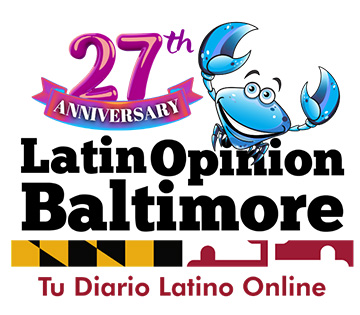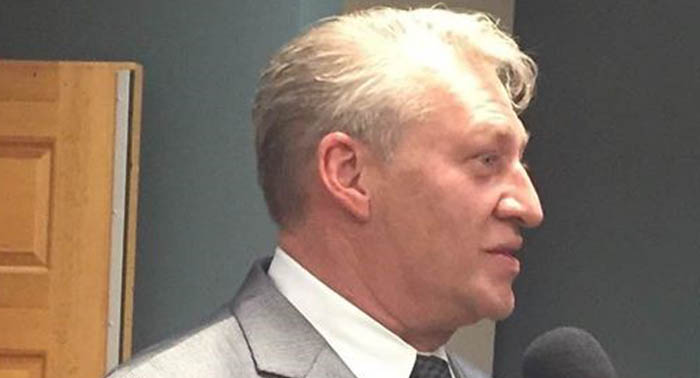This award is a reward for more than 20 years of service


With charisma and a sense for opportunities, Erick Oribio has been able to capitalize a career that today is rewarded, not only with popularity as an important member of the Hispanic community in the state of Maryland, but also with the acknowledgement of those who view from the distance and with a more objective prism, the work of integration and development of life quality in minorities that this sector has achieved during the last 15 years. That is shown in the recent honoring him with the College Success Scholars Service to Society Award, a recognition given by this program of the University of Maryland to those who display a proven result in favor of the society. The founder and head of Latin Opinion LLC, stated his feeling of healthy pride for the position achieved, which grants a platform for going further.
What has receiving this award meant to you personally and professionally?
It means the most important acknowledgment received during my career, due to its social contents. After being notified about this honor I was filled with joy, especially when I knew the mechanism that they use to choose the winner, which is not based on nominations by third parties; but on the observation and evaluation by a qualifying jury of those people whose contribution to their community has been considered of more merit every year.
This is a reward to more than 20 years of service, both from the official and the private fields; and I must say that this award is not only mine, but it also belongs to all the people who, from the beginning, have helped me; that have participated, cooperated, added and believed in what one is doing, especially our clients, the staff at Latin Opinion, our relatives and friends.
During these 20 years of social work, which have been, according to you, the most rewarding events?
Having worked at the leading development of advertising campaigns and education on the Bilingual Voting System implemented in Maryland in 2002. Doubtless it was a highly beneficial project, showing its results nowadays. I am also very proud of having coordinated all the Hispanic activities and strategies during the Maryland Census in 2000, also with excellent contributions to the society. Similarly, having worked as the Hispanic Liaison for the Prince George’s County Executive; having pioneered communitarian radio for regional governments, which have grown in number nowadays, besides the work we have been accomplishing in Latin Opinion during the last 13 years.
How did you get to the USA?
I left Venezuela in 1993, after managing my own company SPV Protocol, which offered protocol services to embassies and corporations, with destination to Puerto Rico to work in a show business company. There, I met a U.S. Company that under a false promise of a job and a visa, determined my arrival to Baltimore in the summer of 1994, only to find out, as a tough reality, that there were not either of those two things.
When I had already decided to return to my country, I met what nowadays is the Esperanza Center. There was a Venezuelan, Jermin Laviera, who still works at the same place today and with whom I continue to be great friends. She phoned and told me “I’ve got a job and housing for you”.
I stayed without figuring how hard it would be to remain without documents in this country and I had to face the tough reality; the jobs that I initially got were as a house painter, waiter, bartender and DJ, while I studied English. My main concern was that someone of my close relatives in Venezuela would die and I wondered what I would do in a case like that.
How did you change from being an undocumented immigrant to becoming a communication entrepreneur?
Once I achieved a sound migratory status, I could produce and air the first radio program in Spanish in Baltimore, called Impacto Latino. It was broadcasted by the CBS chain, through an AM station which was multi-ethnic and offered one hour of program to every different culture present in USA.
I waited during one year for that space, while I solved my migratory status, as a paradox, once I had the program, I knew that I had never needed the status; that it had nothing to do with my achievement, thus clarifying all the information I had received until then from those who insisted that it was not possible without having a legal status in the country. Hence, my message to the immigrants: “No” means “Yes”; and that the keys for success are perseverance and persistence and always addressing yourselves to the primary official sources and never to second hand sources.
How did your career in the U. S. Public Administration begin?
When the program reached one year on the air, the company Mega Communication, which bought two radio stations in Washington, D.C. with signals reaching Baltimore, made me a very interesting job offer to be their sales and promotions representative in public relations in this city. This allowed me to meet many people, and in the year 2000 I had already quit that company. To them I am very grateful, especially to the Venezuelan Elio Aguilar for having given me his entire thrust. I started to work in a project with a newspaper in Spanish which was from Virginia and we brought to Baltimore, called El Hispano, property of the also Venezuelan Johnny Simanca, who gave me the opportunity of leading it quite successfully.
Parallel to that, there was an opening at the Governor’s office in Maryland for the Census 2000, where they needed a person to handle the relations with the Hispanic Community, the press and all the advertising campaigns. I applied to the position there and was hired. Months later, when the census concluded, and after assessing my performance, I was named International and Inter-government Latino Liaison for the Maryland Secretary Of State Office, which I owe specially to my skills acquired in Venezuela and polished in USA about protocol and public relations, together with the principles and moral values received from my parents.
How did the Latin Opinion project emerge?
I consider myself as a natural communicator, even though I was, in two occasions, unable to join a communication school. Despite that, my first professional contact with the communication media was through the radio host Rafael Fidia Escalona, known as the creator of the music term “salsa”, with whom I took my first locution classes at the Radio and Television Workers Union in Venezuela. That spark took me to my radio program in Baltimore. Also, to be a Publisher, for a short time at El Hispano newspaper.
By the year 2004 I only worked at the Latino/Hispano Liaison for the Prince George’s County administration, and this time I chose another activity, which was opening the newspaper initially called Opinión Latina.
What made you then think the conditions were given to create a Latin newspaper in Baltimore?
The void that there was, together with my passion for communicating and broadcasting productive social contents, in terms of the growth of the Hispanic community within the North American society. The first edition was launched in 2004 as a joint venture with Carlos Cruz, an entrepreneur from El Salvador, well known in Baltimore, who, after a tough, nonprofit year, decided to quit the project. That first year wore us out from both the financial and labor points of view, given the fact that by then, the acquisition power of the Latinos was totally ignored and we did not receive advertising pattern. To carry on, I only had the idea of changing the name to Latin Opinion, in English, change that appeared in the July 2005 edition.
Which ones do you believe have been the main achievements of the Latin Community in the region?
The greatest advance for the Hispanic Community in Maryland was crafted in 2002 with the participation for primary elections for the State Congress of the deputies Ana Sol Gutiérrez and Víctor Ramírez, who were afterwards chosen in general elections, for the Counties of Montgomery and Prince George’s respectively. They were followed by Joseline Peña-Melnyk and a growing group of political leaders until the achievement of the current scenario, where we have new deputies, councilmen, judges, majors and a senator.
This process, without doubt, has been the most relevant one, which has generated great transformations, as the latent replacement generation, perfectly bilingual that exists in school classrooms and universities today. We must make people conscious that the only wat to change laws and achieve substantial changes for the benefit of the minorities in main areas such as education, health, employment, businesses, housing, transportation, terrorism and other is through electoral participation.
In your opinion, which would be the most disturbing element for the advancement of the Hispanic community?
The worst enemy for the advances of the Hispanic Community in the region is neither racism nor the English language; it is not the lack of documents. In my opinion, and according to what I have observed during 20 years in Maryland, the worst enemy are a few Latin communitarian pseudo leaders, with great ambition for featuring; who handle dark interests under the wrong appearance of honest people. They are not necessarily Hispanic, but in some cases they are. Sometimes, through nonprofit organizations, appear to be protectors of the community, when what they really doing is obtaining big financial benefits, appealing to maneuvers that lack all the professional ethics rules. They have reached the level of sabotaging community events where the only affected ones are the people who need the resources and information supplied through those activities.
Which ones do you consider as your main social contributions along your career?
My greatest contribution in real benefit terms has been to manage all the affairs related to the Bilingual Voting System implemented in Maryland in 2002. I had the opportunity of customizing radio, press and television campaigns; of giving the presentations in different important Hispanic Centers to train and familiarize people with the system.
I believe that was a very important social contribution, because thanks to that System the interest in the candidates to State Delegates within the state congress increased, understanding that legislators are who can create and forward laws for the benefit of the community. To back up all that, we have the work that we have been impelling with the newspaper and the radio station, which have served as the vehicle for our social, cultural, educational campaigns.
Also, to produce the bilingual segments at the new Maryland Transit Administration Radio Station 93.5 FM WTTZ “The Station that Moves You” is a great contribution for our society.
To whom are you grateful?
To God, Jesus, Saint Onofre, Our Lady of Guadalupe, the Divine Providence, and others. To Beatriz Biardeau (Editor), Alba De La Cruz (General Manager and Partner), Latin Opinion Staff past and present, clients, readers, my parents, my siblings, relatives, friends, and to all those people who have lent me a hand, and who continue to do so, thrusting my ideas, initiatives and projects. I also want to thank John Willis ex State Secretary of Maryland, Marvin Masterson ex State Sub-Secretary of Maryland and to this great nation, for having opened its doors and given me an opportunity to grow as a professional, human being and for the chance of contributing to a better life quality in our society, and special thanks to Jhonny Alejandro Gonzalez who made possible my trip to Puerto Rico, USA, and to my brother and best friend Ronald Oribio without his continue support would it be impossible to achieve this goal.



